Quaker Guns
A sign in Knox’s study might well read, “Beware: Poet at Play.” At her best, Knox’s poetry flirts and teases, creating tensions between words that are a mere letter’s breath away from being the same. It is the nearness of things, the way that one word can fully inhabit another, that so interests Knox. By the end of the book, readers might find themselves believing in Knox’s Russian doll image—that we are all contained, one within the other.
Knox is the author of six other volumes of poetry, including 2004’s He Paves the Road with Iron Bars, as well as the winner of grants from the NEA, Ingram Merrill Foundation, the Massachusetts Cultural Council, and Poetry magazine. In her latest volume, she shows the same attention to history and place. Taking readers aboard Civil War vessels, she pulls out the guns of the title:
They’re Quaker guns, a creative ruse, the kind you couldn’t and wouldn’t
fire: they’re flotsam, jetsam, or any old trees, ships’ logs.
In this case, literal logs. Seen from a distance, they resemble canons. The poem illustrates some of the Knox way of thinking: they are guns and not guns. They are the oxymoron of the peaceable gun.
Her humor doesn’t stop here; she also plays with both form and language, creating erasure poems (where the poem is created by erasing words from other written material, then making sense of the remaining words) as well as nonce tercets where “every line / rhymes with another somewhere or other.” Her play makes words more elastic: “Oh, diamonds (carreau), oh, John Le Carré; oh, Neil Diamond.” By the end of the thought, the lines might lead anywhere.
Knox uses the volume as an opportunity to make her point—words repeat, a cascade of happy oh!s. Ideas repeat—that notion of the interconnected which might begin with a Nerf ball and end with Ella Fitzgerald just as an earlier poem about a husband sitting up in bed, moves from a bad dream about a buried statue to a note about William Lloyd Garrison. In “My Husband Sat Up” she writes:
I wanted to know more. Mary is hidden in Amaryllis
as Amaryllis is hidden in vermiculite
in a red clay pot, buried.
Knox is an accomplished poet with a rich vocabulary and an even richer sense of how the world is inwardly collapsing, from one big idea to the next, one word to another. Reading her is agreeing to a voyage of discovery, rife with playfulness and smarts.
Disclosure: This article is not an endorsement, but a review. The publisher of this book provided free copies of the book to have their book reviewed by a professional reviewer. No fee was paid by the publisher for this review. Foreword Reviews only recommends books that we love. Foreword Magazine, Inc. is disclosing this in accordance with the Federal Trade Commission’s 16 CFR, Part 255.

